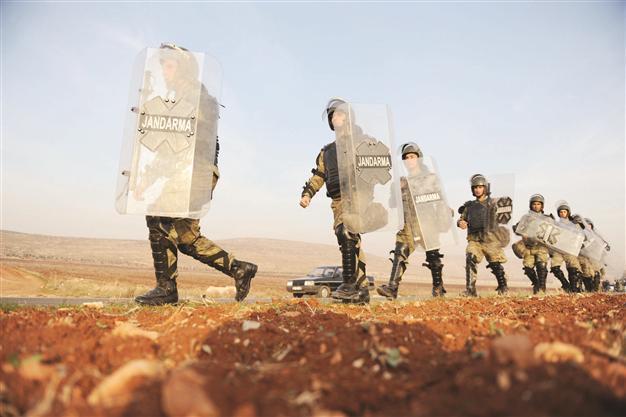Strike ban in military goes back and forth
ANKARA - Hürriyet Daily News

There is a ban on strikes for both the military and civilian personnel working at military facilities such as the gendarmerie. Hürriyet photo
When the Justice and Development Party (AKP) came to power in 2002, serious problems erupted in their relations with the armed forces. The AKP, which has striven for “civilianization” in Turkey throughout its decade-long tenure, has gradually managed to steer its relationship with the military to the point it desired, at times through building up tensions, and at other times by presenting a reconciliatory stance.Let us recall the work of the past few years: Those who were discharged from the armed forces through decisions of the Supreme Military Council (YAŞ) were given a chance to appeal through the judiciary. Military spending was brought under the control of the Court of Accounts. The General Staff’s cosmic room was penetrated; the army battalion stationed in Parliament was moved outside.
What will follow next? An influential AKP member had said that civilian-military relations were finally beginning to take shape on a health foundation, adding that the time was close at hand for the General Staff to become subordinate to the Defense Ministry.
An intriguing yet highly significant proposal also came to the fore at this point, just as preparations were underway to subordinate the General Staff to the Defense Ministry. Civilian personnel employed by the military or the Defense Ministry have been poised to gain the right to strike. The AKP also wanted to tackle this matter, long opposed by the military, which no one dared to bring up.
Parliament’s Labor Commission is currently reviewing the Collective Labor Relations Draft Law. Just as a sub-commission was discussing the section banning strikes and lock-outs, AKP member Mahmut Kaçar issued a proposal to remove the ban on strikes and lock-outs for civilian staff members employed at military facilities. This proposal, which took everyone by surprise, was accepted due to the votes of members of the government. The AKP, it seemed, was eager to grant civilians the opportunity to exercise all their rights, even if they were employed in the armed forces. This amounted to another step forward in matters of civilianization and democratization.
The proposal was consequently passed on to a higher commission, only to meet an unlikely fate there. Already altered in the sub-commission, the proposal was changed once more through the signatures of AKP members. The ban on strikes and lock-outs at military facilities came back into effect once again due to AKP approval. It then became apparent -- through information provided by first-hand sources after probing into the reasons for this change -- that both the military and the Turkish Confederation of Employers’ Unions (TİSK) had cautioned against enacting such a measure in “a strategically significant sector.” The sub-commission, however, had also issued such a warning, and it had already been made clear that the Cabinet withheld the right to postpone such strikes on grounds of “national security.” Unless a new change comes about in Parliament, the strike ban at military facilities will remain in effect.
Hidden camp for charter works
Parliament’s Constitutional Conciliation Commission will begin penning the contents of the new constitution starting May 1. The commission, presided over by Parliamentary Speaker Cemil Çiçek, is set to complete the new text by mid-summer. Members of the commission, however, want to meet at a location outside Ankara to avoid any kind of external pressure, and officials are now looking for a hidden location. Among the choices are places such as Abant and Ilgaz.
Rıza Türmen from the Republican People’s Party (CHP) has also noted the benefits of meeting in such a location. Once officials pick and choose a location, the commission will meet in 10-day blocks and discuss the contents of the new charter. Let’s and wait and see where they pick.
Third judicial package coming
The Sivas Massacre case was dropped due to the statute of limitations. The period for the statute of limitations had been raised to 45 years with an amendment in 2005.
This, however, did not affect the Sivas Massacre case. There is talk of new preparations regarding the matter in the backrooms. Parliament’s Justice Sub-commission is currently reviewing the third judicial package. It is said the heart-wrenching issue of the statute of limitations could also be rearranged through this package. Prime Minister Recep Tayyip Erdoğan, however, has not yet given his consent, according to what I have heard. “It would be naïve to expect any results from such ventures,” said the CHP’s Emine Ülker Tarhan.











